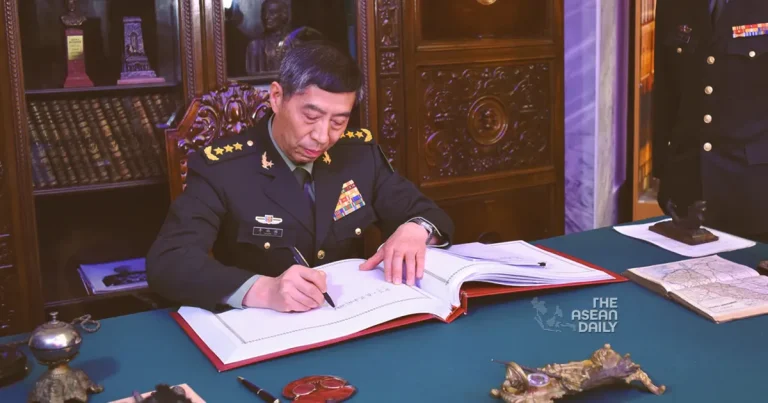16-9-2023 (BEIJING) General Li Shangfu, a stalwart of China’s military modernization efforts, ascended through the ranks to assume the role of defense minister earlier this year. However, within a mere six months, he vanished under the shadow of a corruption investigation.
Li rose to prominence during President Xi Jinping’s tenure, marked by a fervent pursuit of military prowess, while China’s relations with the United States deteriorated over various issues, including Taiwan—a democratically governed island that Beijing claims. Nonetheless, part of Xi’s strategy to bolster China’s military strength has been to combat the deep-seated corruption that has plagued not only China’s military but also other state institutions.
Leading China’s advancements in space and cyber warfare development and subsequently serving as the head of military procurement, Li, aged 65, was promoted to defense minister in March. However, last month, he disappeared from the public eye, missing meetings, including with foreign counterparts. On Friday, Reuters reported that Li was under investigation as part of a broader probe into military equipment procurement. The specific purchases under scrutiny remain undisclosed, and China’s defense ministry has not provided any comments on the matter. The foreign ministry’s spokesperson stated on Friday that she was not aware of the situation.
While Li’s role as defense minister is generally seen as diplomatic and ceremonial, he also serves as one of China’s five state councillors, a cabinet position that holds higher rank than other ministers. Furthermore, he plays a more public role than others within the Central Military Commission, China’s top defense body, commanded by Xi. His relations with the United States, which imposed sanctions on Li in 2018 for buying weapons from Russia, have significantly shaped his tenure.
SANCTIONS OR DIALOGUE
Li assumed office at a time when Washington was seeking to restore military dialogue and communications that Beijing had suspended in response to a visit to Taiwan by the then-Speaker of the House of Representatives, Nancy Pelosi.
Chinese officials have consistently asserted that the U.S. should lift sanctions on Li if it wishes to resume high-level military communications—a delicate situation as Washington and Beijing engage in disputes ranging from trade to Taiwan.
In June, Beijing declined a U.S. request for a meeting between Defense Secretary Lloyd Austin and Chinese officials at a prominent annual security forum in Singapore. Their interaction ended with a handshake.
During the forum, Li cautioned that conflict with the U.S. would lead to an “unbearable disaster” and stressed that China preferred dialogue over confrontation.
In mid-August, he held meetings with senior officials in Russia and Belarus, demonstrating support for countries diplomatically isolated by the West following Moscow’s invasion of Ukraine.
Li was last spotted in Beijing on August 29 when he delivered a keynote address at a security forum with African nations.
TECHNOCRATIC ORIGINS
Li’s background as a technocrat—an aerospace engineer who worked on China’s satellite program—proved valuable in striving to meet Xi’s objectives for the People’s Liberation Army (PLA), according to experts.
James Char, a security scholar at Singapore’s S. Rajaratnam School of International Studies, commented, “The operational and technological background of the next Chinese defense minister is especially pertinent given that the PLA aims to become a world-class military by 2049.”
In 2016, Li was appointed deputy commander of the PLA’s nascent Strategic Support Force, an elite unit responsible for advancing China’s capabilities in space and cyber warfare.
Subsequently, he assumed the role of head of the Equipment Development Department of the Central Military Commission. Li faced sanctions in 2017 for the acquisition of 10 Russian Su-35 combat aircraft and equipment related to the S-400 surface-to-air missile system.
In July, the department took the unusual step of announcing its intent to “clean up” the bidding process and invited the public to report irregularities dating back to October 2017 when Li led the unit. He remained in charge until October 2022.
Li’s tenure at the Central Military Commission underscored his close ties to Xi, who has solidified his influence throughout the military. Some experts believe Li maintained a strong connection with Zhang Youxia, a key military ally of Xi, whom Li succeeded as head of the department.
During the Communist Party Congress last year, Zhang was promoted to the position of first vice chairman of the military commission, with Li following as a member of the commission’s seven-person governing group.
Despite the uncertainty surrounding Li’s absence, analysts suggest there is no shortage of senior military officials who could assume the figurehead role of defense minister. A more significant question pertains to the ongoing regional tensions and the extent to which Beijing will continue to prioritize China’s military diplomacy.




